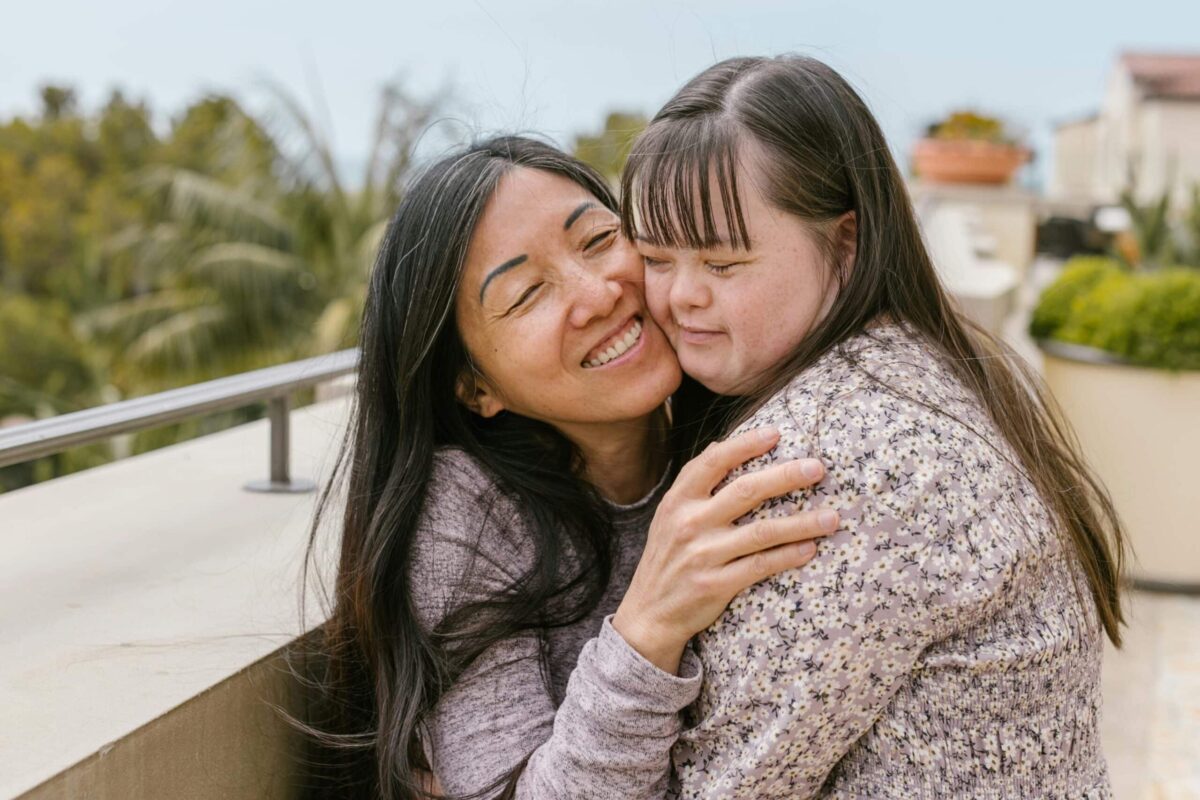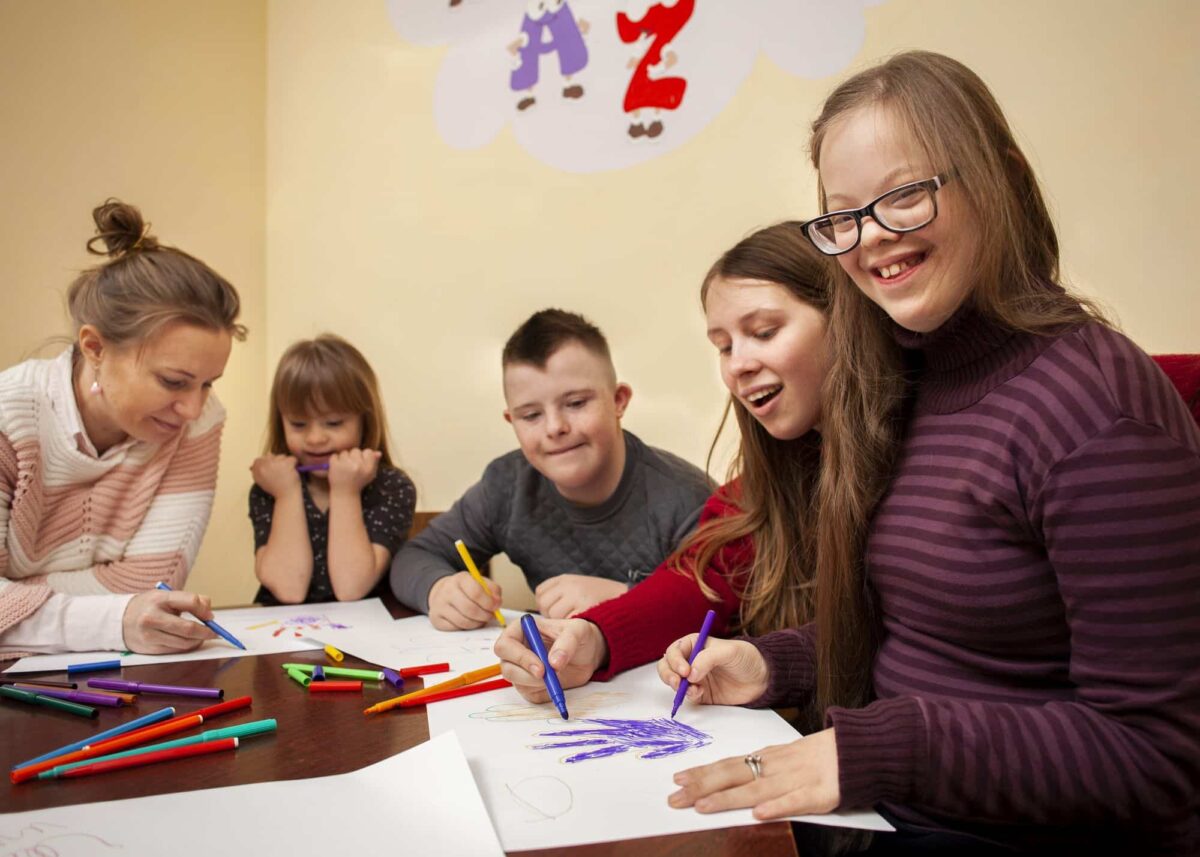Embracing autism means recognizing that autism spectrum disorder (ASD) encompasses a range of neurodevelopmental conditions that affect communication, behavior, and social functioning. Each autistic child has unique strengths and challenges, so personalized approaches to support are essential.
ASD includes various autistic traits, such as repetitive behaviors, difficulty with social interaction, and sensitivity to sensory input. Potty training can be particularly challenging for some children with ASD due to sensory sensitivities or difficulty with communication. Embracing autism involves understanding these traits and fostering an environment where autistic children can thrive, including supporting them through milestones like potty training.
Success Stories
“Move Up ABA has been a lifeline for our family. Before starting therapy, our son struggled with daily routines and communication. Now, he’s more independent and even initiated a conversation with a classmate for the first time! The progress we’ve seen in just six months is truly remarkable.”
- Emily R., Silver Spring, Accountant
“As a single dad, I was overwhelmed trying to manage my child’s behavior. The Move Up ABA team not only provided amazing support for my little girl but also taught me practical strategies to use at home. Their in-home sessions fit perfectly with our busy schedule. I’m so grateful for their patience and expertise.”
- Michael T., Rockville, Middle School Teacher
“We were hesitant about starting ABA therapy, but Move Up ABA’s approach put us at ease from day one. Our twins have made incredible strides in their social skills and self-regulation. The therapists are like extended family now, and we couldn’t be happier with our decision to work with them.”
- Aisha and James L., Simpson, Police Officers
Ready to start your child's journey to success? Schedule a free consultation today! 📞 Call (410) 497-8865.
The Challenges and Strengths of Autistic People

Autistic people often experience sensory processing challenges, such as hypersensitivity to noise, textures, or bright lights. Embracing autism, these sensory differences can lead to sensory overload and overwhelming specific environments.
However, autistic individuals also possess remarkable strengths, such as attention to detail, creativity, and unique problem-solving abilities. Behavioral therapy can be essential in supporting these strengths, helping individuals build on their capabilities while addressing challenges. Recognizing and celebrating these strengths is vital to embracing autism and supporting autistic people.
Navigating Sensory Overload and Processing Challenges
Sensory overload is a common experience for autistic children, triggered by stimuli like loud sounds, crowded spaces, or unexpected changes. To help an autistic child, caregivers can create sensory-friendly environments that reduce overwhelming stimuli.
Sensory processing disorder often co-occurs with autism, affecting how individuals interpret sensory input. Addressing these sensory challenges with noise-canceling headphones, weighted blankets, and therapy activities tailored to sensory needs can significantly improve an autistic child’s quality of life.
Raising Two Autistic Daughters: Valuable Insights
Parenting two autistic daughters offers valuable insights into the diverse experiences of autistic people, particularly in the development of social skills. Each child may display unique autistic traits, emphasizing the importance of personalized approaches.
From managing sensory challenges to fostering independence, parents of autistic daughters learn to navigate both the joys and challenges of raising children with autism spectrum disorder while setting therapy goals. Sharing these experiences helps others embrace autism with compassion and understanding.
Tackling Difficult or Taboo Subjects in Autism
Difficult or taboo subjects, such as communication struggles or public misunderstandings, can make discussing autism challenging. Open conversations can help break down stigma and provide support for autistic children and their families.
Addressing these taboo subjects requires empathy, honesty, and early intervention, creating opportunities for learning and advocacy in the autism world. By normalizing these discussions, society can better embrace autism and its complexities.
Enhancing Social Functioning in Autistic Children

Social functioning is a key area where autistic children often need support. They may find it challenging to interpret social cues, make friends, or engage in group settings.
Teaching social skills through structured activities, therapy techniques, role-playing, and peer interaction can help autistic children navigate social situations. Supporting social functioning empowers them to build meaningful relationships and thrive in social environments.
A Newfound Perspective: Embracing Autism
Embracing the embrace autism symbol offers a newfound perspective on the diverse abilities of autistic people. Instead of focusing solely on challenges, it highlights the unique contributions and perspectives they bring to the world.
This perspective encourages society to see autism as a valuable aspect of human diversity. By shifting the focus to acceptance and inclusion, the autism world becomes a more supportive space for autistic individuals. It acknowledges how autism affects learning, and much like a newsletter for weekly blog shares, it fosters understanding and connection by sharing insights.
Supporting Autistic Children Through Their Journey
Each autistic child’s journey is different, requiring patience, understanding, and a willingness to adapt. Building trust and offering consistent support can significantly impact their development and well-being.
By prioritizing individualized care and celebrating achievements, caregivers can help autistic children build confidence and embrace autism as part of their unique identity. This approach fosters resilience and growth in all areas of life.
How Society Can Embrace Autism
Creating an inclusive society involves addressing autistic people’s barriers in education, employment, and social settings. Providing accommodations, raising awareness, and encouraging acceptance are crucial steps.
Embracing autism means celebrating neurodiversity and recognizing the valuable contributions of autistic people. A supportive society, including access to resources like insurance coverage, allows them to reach their full potential and thrive as part of a diverse community.
Celebrating the Strengths of Autistic Traits

Autistic traits, such as heightened focus on specific interests and exceptional problem-solving skills, are often sources of strength. Many autistic people excel in areas requiring precision, creativity, or deep concentration.
These strengths are valuable not only to individuals but also to the broader community. By embracing these traits, families, and society can help autistic children realize their potential and build confidence in their abilities.
Navigating the Autism World as a Family
The autism world can feel overwhelming for families new to the diagnosis, with its medical terms, therapies, and educational resources. However, it also offers a supportive community with shared experiences and valuable insights.
Parents and caregivers can connect with support groups, educators, and professionals to learn how to advocate for their autistic child. Navigating the autism world together fosters understanding and ensures the child receives the necessary resources.
Sensory Processing Disorder: Practical Strategies
Sensory processing disorder often coexists with autism spectrum disorder, making daily tasks challenging for some autistic children. Simple adjustments, such as dimming lights or using sensory-friendly materials, can reduce discomfort.
Therapies like occupational therapy can further help autistic children with behavior management and manage sensory sensitivities. Practical strategies tailored to the child’s sensory preferences can significantly enhance their ability to function and feel comfortable in various environments.
The Importance of Community Support for Autistic People
Community support is vital for autistic people and their families. It offers understanding, connection, and shared resources. Support networks can help autistic children feel included in social activities and events.
Whether through schools, advocacy groups, or local organizations, these connections create opportunities to celebrate neurodiversity. By fostering inclusive communities, society ensures that autistic individuals feel valued and understood.
Empowering Autistic Daughters Through Advocacy

Raising autistic daughters involves understanding their unique needs and strengths while advocating for their rights. Education about sensory overload, social interactions, and autistic traits helps families support their daughters effectively.
Empowering two autistic daughters, for example, might include teaching self-advocacy, engaging in therapy games to build social and emotional skills, and ensuring access to supportive environments. Advocacy opens doors to opportunities and helps autistic children embrace their identity with pride.
Addressing Taboo Subjects in Autism Conversations
Taboo subjects, such as meltdowns or communication barriers, are often avoided but are crucial to understanding autism spectrum disorder. Honest discussions can provide clarity and reduce the stigma surrounding these experiences.
Opening up about these difficult topics allows families and caregivers to share solutions and seek support. By addressing taboo subjects head-on, society can better support autistic people and their families.
Building Confidence in Autistic Children
Confidence is vital in helping autistic children navigate the challenges of everyday life. Encouragement, consistent routines, and celebrating small victories can boost self-esteem and foster independence.
Providing opportunities for success, whether in academics, hobbies, or social settings, allows autistic children to develop a sense of pride in their achievements. This confidence helps them embrace autism as part of their identity.
Moving Toward a Neurodiverse Future
Embracing autism is a step toward building a more inclusive, neurodiverse future. Society benefits from the unique perspectives and talents that autistic people bring to various fields.
By continuing to raise awareness, improve resources, and promote acceptance, we create a world where neurodiversity is celebrated. This progress ensures that autistic children and adults can thrive in all aspects of life.
A Call to Action: Embrace Autism Fully
To fully embrace autism, we must shift our focus from deficits to strengths. Supporting autistic children means valuing their individuality and ensuring they feel seen and supported.
We can create a more accepting and inclusive society through education, community involvement, and advocacy. Embracing autism enriches the lives of everyone and fosters a culture of understanding and respect for all.
The Role of Education in Embracing Autism

Education is critical in supporting autistic children and preparing them for the future. Inclusive educational environments that accommodate autistic traits foster learning and social development.
Teachers and schools can embrace autism by implementing individualized education plans (IEPs), incorporating ABA therapy, creating sensory-friendly classrooms, and fostering clear communication. These adjustments ensure that autistic children receive the tools they need to succeed.
Understanding the Unique Experiences of Autistic Daughters
Autistic daughters often face distinct challenges, including societal expectations and misdiagnoses due to less obvious autistic traits. Recognizing their needs requires a nuanced approach and sensitivity to their experiences.
Parents raising two autistic daughters, for instance, gain valuable insights into these unique experiences. Supporting autistic girls involves understanding how they perceive the world and providing tailored interventions to help them thrive.
Autism Acceptance in Everyday Life
Acceptance goes beyond awareness, focusing on valuing autistic people for who they are. This involves recognizing their individuality and supporting them in overcoming challenges without expecting conformity to neurotypical standards.
Small actions like respectful language and accommodating sensory needs demonstrate acceptance. These everyday efforts contribute to a society where autistic children and adults feel respected and included.
The Power of Advocacy in the Autism World
Advocacy is a powerful tool for driving change and improving the lives of autistic children and their families. Whether through personal efforts or involvement in larger organizations, advocacy raises awareness and creates opportunities for inclusion.
Parents, educators, and community members can use their voices to champion causes like better educational resources, workplace inclusion, and healthcare access for autistic people. Advocacy is the foundation of a more equitable autism world.
Supporting Social Growth for Autistic Children
Social growth is an essential focus for autistic children, as they often face challenges understanding social cues and building relationships. Structured social skills programs can help children navigate these situations with confidence.
Encouraging peer interactions in a safe, supportive environment fosters social functioning and builds essential life skills. Social growth helps autistic children connect with others and develop meaningful relationships.
Celebrating Milestones in Autism Journeys

Every milestone, no matter how small, is a significant achievement for autistic children. Celebrating these moments reinforces positive behaviors and builds confidence in their abilities.
From learning a new skill to adapting to a new routine, milestones reflect the progress autistic children make over time. Acknowledging these achievements fosters a sense of pride and encourages further development.
The Long-Term Benefits of Embracing Autism
Embracing autism has long-term benefits for autistic people and society as a whole. Acceptance and inclusion lead to better outcomes in education, employment, and overall well-being for autistic individuals.
By creating an autism-friendly world, we pave the way for a more compassionate and diverse society. The contributions of autistic people enrich every aspect of life, from innovation to creativity and beyond.
Conclusion
The journey to embracing autism begins with understanding, compassion, and action. By addressing challenges, celebrating strengths, and fostering inclusion, we can create a supportive environment for autistic children and adults alike.
Together, families, educators, and communities can build a world where every autistic child feels valued and empowered. These efforts ensure a brighter, more inclusive future for all.






